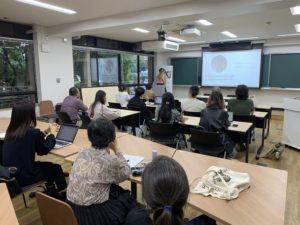2023.Oct.30
REPORTSReport on the Lecture by Dr. Jeanette Hofmann Entitled “Imagining Democracy through the Lens of Learning Machines”
Kyoko Takeuchi (Project Assistant Professor of the B’AI Global Forum)
・Date: Friday, October 20, 2023, 16:30-18:00 (JST)
・Venue: Institute for AI and Beyond, The University of Tokyo, Asano Campus
・Language: English
・Speaker: Dr. Jeanette Hofmann(Professor, Institute for Media and Communication Studies, Freie Universität Berlin; Research Director, Alexander von Humboldt Institute for Internet and Society)
・Moderator: Yuko Itatsu (Professor, Interfaculty Initiative in Information Studies, The University of Tokyo)

On October 20, 2023, the B’AI Global Forum invited Dr. Jeanette Hofmann to speak on “Imagining democracy through the lens of learning machines.”
Regarding the relationship between AI and democracy, some have argued that democratic elections and free markets would be rendered meaningless if AI were to make decisions on behalf of humans. However, Dr. Hofmann disagrees with this view of AI and democracy as simply opposites; what she discussed in her talk is how AI and machine learning may open up new ways of understanding democracy.
First, Dr. Hofmann explained that in Enlightenment Europe, the “state as a clockwork” became a powerful metaphor for social order, predictability, and hierarchy. While this mechanical worldview prevailed, a worldview that could be described as a cybernetic paradigm based on complexity, feedback loops, and unpredictability is now emerging. In other words, rather than the mechanical assumption of cause-and-effect relationships whereby A causes B, more complex feedbacks, such as the output of a system giving rise to the next input, are occurring widely in society, including in daily life.
Dr. Hofmann then suggested that AI and its underlying technologies, such as algorithms and data, could drive cybernetics and form a new political imagination that could both critique current institutions and inspire democratic reform. For example, some Silicon Valley thinkers have portrayed representative-based democracy as an aging technology and suggested that it be represented by personalized AI senators. She also noted that algorithms are already creating feedback loops from a variety of data in the areas of citizenship and border control. Overall, Dr. Hofmann raised the possibility that AI could change the way we experience and conceptualize democracy through new metaphors and expectations in alignment with machine learning.
In the discussion, the ways in which the two paradigms of the “state as a clockwork” and “the feedback loop” coexist with tension, and how these paradigms may evolve differently in different countries, were discussed. Concerns were also raised about the possibility that feedback loops could create new power and centrality, that it would be difficult to reflect the opinions of small communities, and that the work of digitization could depend on the labor of people in poor countries. Overall, Hofmann’s thesis was extremely significant in that she did not simply criticize the impact of AI in existing democracies, but rather presented an alternative framework that seeks to de-normalize democracy through the use of AI, opening up new possibilities.